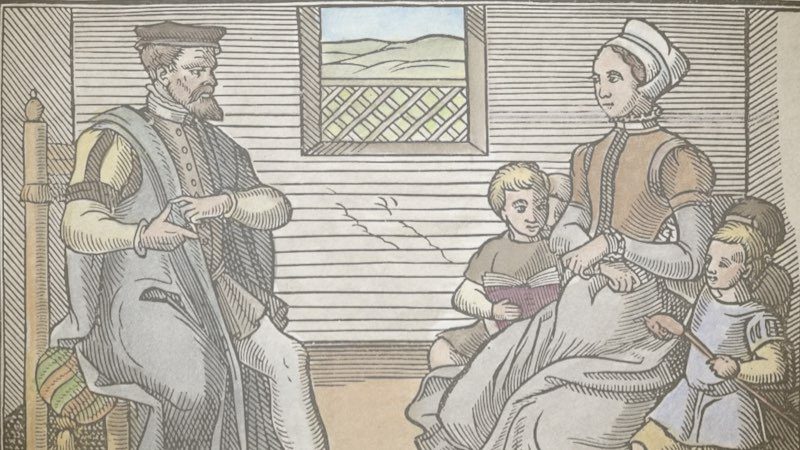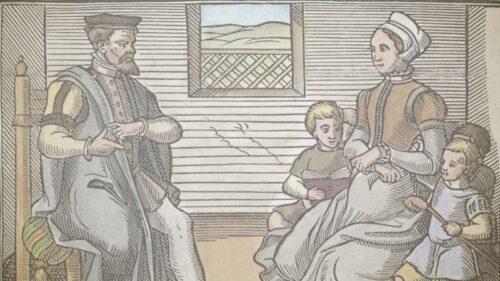
Chapter 3
My birth — Lameness — Imitation of my fathers prayers — Meditations upon the heavenly bodies — Sent to school — Disgusted with study — Letter to sister — Mr. de la Bussiere — Admirable preceptor — Eccentric man — Enter college — Take degree of Master of Arts — My mother’s death — Division of property
I have now arrived at the history of my own life, which I shall give more in detail, as being more immediately interesting to you than those which have preceded it; and you will find a tissue of adventures, checquered with extremes of prosperity and adversity, but amidst all its varied joys and sorrows you cannot fail to discern the hand of Almighty God, whose good providence may be distinctly traced watching over me and making all things work together for my ultimate advantage.
I was born at Jenouille, on the 7th April, 1658. The first disaster which befell me proceeded from the carelessness of my nurse; she trusted me to her daughter, a young, and giddy girl, who played with me, tossing me in the air and catching me in her arms, until at last she missed, and I fell to the ground and broke my leg. The nurse, afraid to inform my parents, took me to an ignoramus of a surgeon, who pronounced that no harm had been done. The result to me has been lameness for life, my right leg being shorter, thinner, and much weaker than the other. I inherited something of the family beauty of face, and was of a very lively and inventive turn. When only four years old, I was so taken with my father’s reading of the Scriptures, and praying with the family, that I had a fancy to imitate him, and calling together the servants and my sisters, I made them kneel down while I prayed. They gave my father such an account that he had a curiosity to be present also; I would not proceed unless he knelt down with the rest; and my mother has since told me that he was much affected by the earnestness of my manner, and discovering, as he thought, the germ of future talent and piety, he himself prayed heartily to God to preserve and bless one who evinced a zeal unusual among children. I was younger by seven years than any of my brothers and sisters, and this circumstance occasioned my being left much to myself, and I used to reflect a great deal; and some of my meditations in childhood being a little remarkable, I will not pass them by. You must bear in mind that my knowledge was derived from no book save the Holy Scriptures, which I hear my father read daily. I beheld the glorious sun arise each morning to renew our joys and pleasures, and every night thousands of stars enamelled the vault our heads; I also noticed another beautiful luminary, which day by day decreased, and again returned to its first glory by the same degrees. Now I knew from the Scriptures that God inhabited a light which no man could approach unto; and that he dwelt in the third heaven, to which St. Paul had been caught up. I concluded thence that his dwelling place was above the sun, moon. and stars, and that in order to hold him and the celestial court, consisting, as I understood, of an infinite number of angels and glorified saints. I imagined the floor of the third heaven must be of a solid and opaque substance, and the dwelling place of God all resplendent with the light that his glory diffused around him. I concluded that what we saw of the sun, (beauteous as it is) was but a hole in the ceiling of the second and floor of the third heaven, which illuminated us with a faint gleam of that light which shone fully upon the angels and, saints. As to the stars, they were only so many gimblet holes in that part which was opposite to, the sun and most distant from the throne of God. The moon, too, I supposed to be a hole nearly as large as the sun, but situated, like the stars, away from the immediate presence of God. As to her changes, they gave me no trouble. for taking the lid of a pot and sliding it over the top produced exactly the same varied form, and I left the angels of God to slide the round cover over the round hole of the moon according as they bidden. My only difficulty was to find out how the heavens could turn round without shaking the foundations or pillars upon which David said the earth rested. But if my reason proved unequal to the solution, my faith made up all deficiencies, being confident that to Him who made all things out of nothing, it could not be difficult. In cloudy weather I prayed earnestly to God to lift up his foot from the round hole which gave us light.
I was sent from time to time to divers schools, and at seventeen years of age I had committed to memory vast quantities of Latin, but memory was the only talent that had been cultivated, my understanding and reasoning powers had been suffered to slumber. I became perfectly disgusted with study, and forming about this time an intimacy with a druggist’s apprentice, I thought it would be a delightful thing if I could persuade my mother to let me throw aside my books and turn shop-boy. But how to set about it I did not know, for I had been dedicated to the ministry from my birth, and I well knew it would almost break my mother’s heart if I were to give it up. I at last resolved to make my sister Ann (the only one unmarried) my confidante. I wrote her a long letter, enlarging upon the length of time I had studied, the little progress I had made, and the poor hopes I had of doing any better in future. I told her I had the greatest reverence for the ministerial office, and looked upon it as the most honorable of all employments, but then, if it was an undertaking beyond my strength, the requisite gifts being deficient, it would only be wasting time and money for me to persevere. After dwelling at length on my incapacity, I wound up by disclosing my secret wish to go into a druggist’s shop, and I begged of her to tell it to my mother, as a suggestion of her own, on some very favorable occasion, and by no means to show the letter to her. Notwithstanding all my precaution, my sister felt it to be her duty to make my communication public, and a family council was held as to what was to be done, and it was unanimously decided that the very ingenuity of my arguments to prove incapacity went to establish the fact of its being inclination, and not talent, that was wanting. My mother took it to heart so much, that she absolutely fell sick; but she was determined to keep me at study for some time longer, at any rate. Soon after this struggle for liberty, I was for the first time placed under a tutor who had the art of drawing forth any talent that I might possess. Mr. De 1a Bussiere was a Protestant layman, and very eccentric. He was an excellent Latin and Greek scholar, a pretty poet and a good physician; he was as obstinate as a mule; he drank to excess, but did not commence his potations until the labors of the day were ended. He had ten or twelve pupils, but no boarders; for he and his wife had only one small apartment, which served as kitchen, bedroom, and study. He wore a little cloak, once black, now of a reddish brown, threadbare, and always covered with dust. He never used a razor, but when his beard became inconveniently long, he cut it off with scissors. Their slovenly apartment did not contain such a thing as a looking-glass. In short, he was, what in England they call, a mere scholar; he had learning, and nothing else. I began to study under him upon an entirely different plan, and in a short time his explanations and exercises brought into play the stores that memory had laid up, and I was astonished to find that I had accumulated such a mass of materials without knowing how to make use of the until now. We had no holyday except Sunday, and on Monday morning we were required to give a full account of the sermon we had heard on the preceding day. I remained three years with him, and when we parted, both he and I were satisfied with the progress I had made.
He certainly understood human nature, and had the art of guiding others in a remarkable degree. A single word of reproof from him was more grievous to me than the severest punishments inflicted by former preceptors.
My next step was to the college of Guienne, and there great mortification awaited me. Latin was the only language made use of and I had never been accustomed to speak it, (though I was familiar with all the best Latin authors) and I found it impossible to follow the Lecturers. I did not allow myself to be discouraged, but hired the assistance of a private tutor for the hours of relaxation, and by this means I was soon able to keep peace with the Professors; and I may say with truth, that during the two years I remained at college, I spent sixteen hours out of every twenty-four in study. At the age of twenty-two I took my degree of Master of Arts, and of fourteen who passed at the same time, I stood second on the list. Thus, with five years of hard study, I made up in some degree for the previous nine years of negligence. About this time my dear mother ended her life of piety and usefulness.
In France, by law a man is not of age until he has completed his twenty-fifth year, but my brothers, disliking the trouble of managing my property, made me of age, or free, immediately after my mother’s decease. My brothers and sisters were all married, and had long ago received the greater part of their portions, so that in making the final division of property, the estates of Jenouille and Jaffe fell to my share.
James Fontaine (1658) was the great-great-great-great-great-great-grandfather of Jared Smith (Editor of the AHB). He wrote an autobiography, the material of which was compiled and published by some of his descendants. The first publication is called, ”A Tale Of The Huguenots Or Memoirs Of A French Refugee Family (De La Fontaine)” (1838). The second publication is called, “Memoirs Of A Huguenot Family” (1872).
"A Tale Of The Huguenots Or Memoirs Of A French Refugee Family (De La Fontaine)", 1838 (Complete)
Memoirs Of A Huguenot Family, 1872 (Complete)




